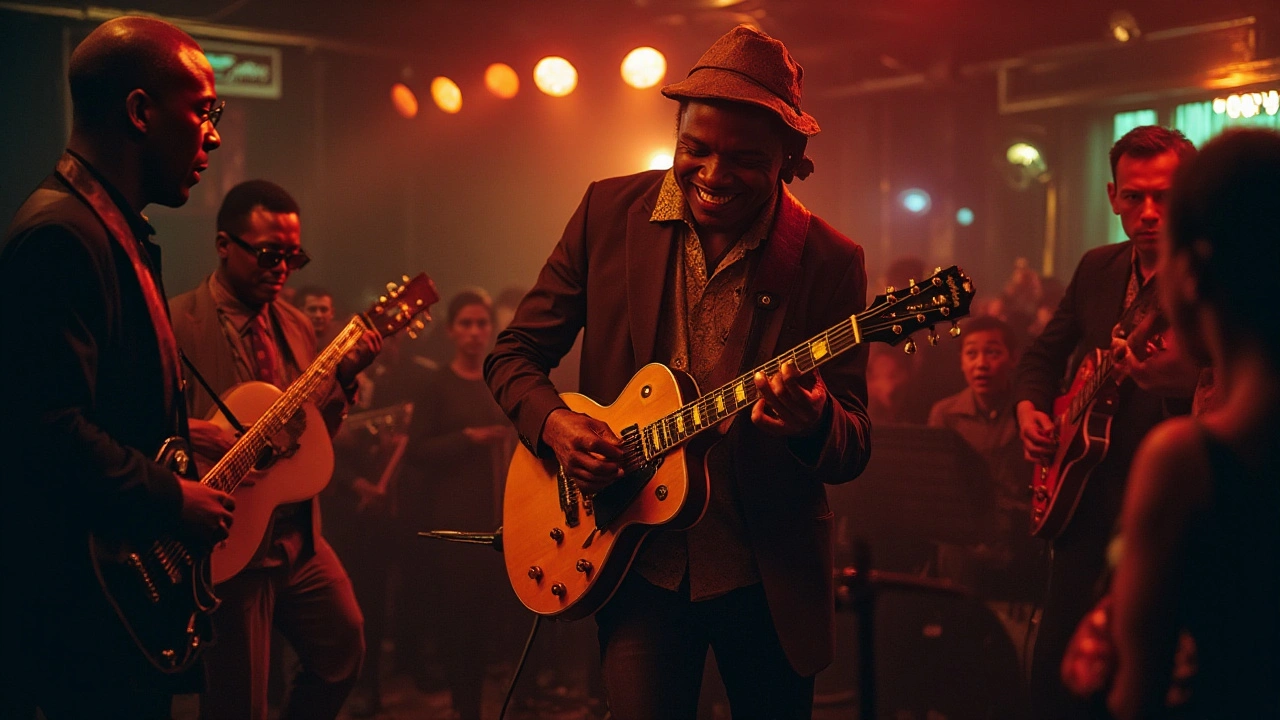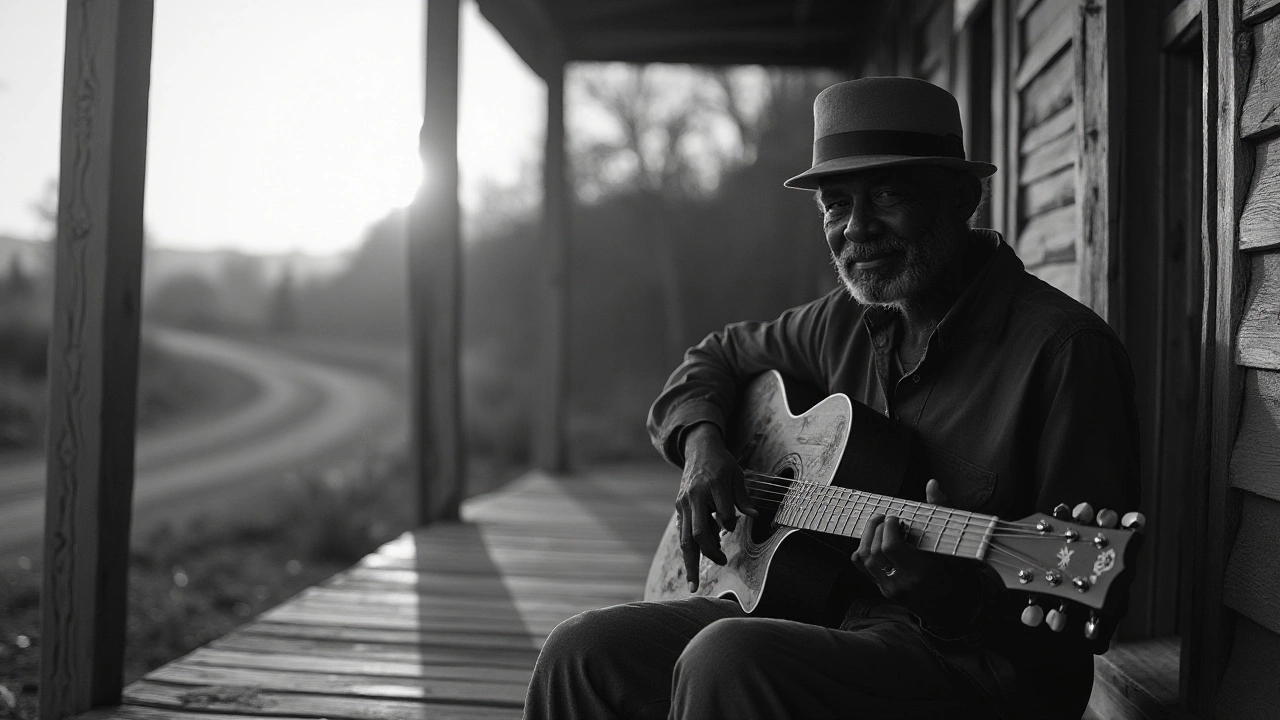In a world saturated with musical genres, blues music stands apart by wielding the profound ability to evoke raw human emotion. It serves as both a mirror and a balm, reflecting the struggles of life while comforting weary souls with its soulful melodies.
For anyone drawn into the depths of blues, understanding the rich tapestry of its history and its evocative nature can enhance the listening experience. From its humble beginnings to its pervasive influence in contemporary music, the blues remains a testament to the power of music to heal and bring people together.
- The Origins of Blues Music
- Emotional Themes in Blues Lyrics
- Influence of Blues on Modern Genres
- Notable Blues Artists and Their Impact
- Tips for Appreciating Blues Music
The Origins of Blues Music
The story of blues music is as intricate and compelling as the melodies it produces. Emerging in the late 19th century, the genre finds its roots in the African American communities living in the Deep South of the United States. The origins of blues can be traced to the post-emancipation period, a time of struggle and resilience as African Americans sought to find their place in a country slowly healing from the scars of the Civil War. Blues, in its raw form, was a powerful means of expression, channeling both the sorrow and joy of a people embodying the spirit of endurance and hope.
Initially, the blues developed from African American spirituals, work songs, and field hollers—a poignant mix of vocal expressions used by slaves and later by sharecroppers to convey messages and uplift spirits during grueling labor. This unique melding of vocal traditions with European musical structures gave rise to a distinct sound that was deeply personal and reflective of the human condition. Over time, as these early forms of music were incorporated into larger social contexts like juke joints and barrelhouses, the blues began to shape its identity.
While it wasn't until the early 20th century that the term "blues" was officially used to describe this musical style, its recognition owes much to the rise of railroads and the Great Migration. These movements led to the dispersal of African Americans across the country, bringing their musical traditions to urban centers like Chicago and St. Louis. In these diverse environments, blues continued to evolve, absorbing the influences of neighboring musical styles and technology. This evolution culminated in a variety of blues forms, from the rural Mississippi Delta blues to the more electric urban blues that arose later in northern cities.
When considering the immense social and cultural impact of the blues, one cannot overlook pivotal figures like W.C. Handy, often dubbed the Father of the Blues. Handy’s assembly of the first blues sheet music, published in 1912 as the "Memphis Blues," helped catapult the genre into mainstream consciousness. As blues gained popularity, it set the foundation for both the jazz and rock 'n' roll genres. According to a quote by musician Keith Richards, "If you don't know the blues... there's no point in picking up the guitar and playing rock and roll or any other form of popular music."
Emotional Themes in Blues Lyrics
The world of blues music is painted with raw emotion and soul, offering a canvas onto which listeners project their experiences, feelings, and reflections. Blues lyrics have an incredible power to convey some of the deepest human emotions—longing, heartache, hope, and resilience. This dimension of music offers listeners an honest, unfiltered glance into the human spirit, setting it apart as a timeless form of artistic expression. From the personal struggles and societal issues to tales of personal triumph, the genre's power lies in its ability to make the listener feel and reflect on universal human themes like sorrow and joy. The lyrics serve as narratives—simple yet profound, often weaving stories that resonate with audiences worldwide.
Blues music often serves as an emotional outlet for both the artist and the listener because of its relatable themes. At its heart, the blues is about storytelling, and the stories it tells are raw and authentic. Unlike other musical genres where lyrics may often be abstract or laden with complex metaphors, blues lyrics speak plainly and truthfully, which forges a powerful connection between the artist and the audience. Through the simplicity of verse and melody, blues artists achieve a resonant emotional impact, candidly portraying life's challenges and celebrating the resilience of the human spirit. The essence of the blues lies in its ability to speak truth to power and give voice to the voiceless, often reflecting on themes that hold great cultural significance, both historically and in contemporary society.
"The blues tell the story of life’s difficulties and, if you think for a moment, you realize that all of the songs are about triumphing over adversity." — James A. Baldwin
It's interesting to note how different blues artists continue to draw on varied experiences—ranging from love and loss to economic hardship and personal liberation—enabling the genre to remain relevant across generations. The universal appeal of blues lyrics rests in their capability to mirror personal adversities and victories in a way that feels both intimate and collective. Musical giants like B.B. King and Muddy Waters, with their distinctive styles, have laid a foundational blueprint through their evocative storytelling for countless musicians to follow. These stories highlight the indomitable human spirit and elicit a shared empathy, providing solace and camaraderie through the understanding that, though individual experiences may differ, the emotions underpinning them often do not.
Exploring the spectrum of emotions in blues music, it’s notable how much depth and substance can be embedded in simplicity. From lyrics about unrequited love to those portraying a yearning for freedom or justice, blues taps into the richness of life's experiences. This is one of its enduring legacies—transcending cultural and linguistic barriers and reaching into the hearts of listeners with its universal appeal. Artists continue to creatively explore topics that matter deeply to their communities, and by doing so, they ensure that the blues is not merely a historical or cultural relic, but a living, breathing form of artistic endeavor that continually evolves.

Influence of Blues on Modern Genres
Blues music holds an indomitable position in the pantheon of musical genres, having laid a solid foundation for many contemporary styles that dominate today's soundscape. Its influence is palpable in rock, jazz, and R&B, among various other genres, exercising a profound impact on artists who often channel its raw emotion and storytelling power. For example, rock music draws heavily from blues, with legends such as Elvis Presley and The Rolling Stones adapting blues' heartfelt lyricism and distinctive chord progressions. This adaptation helped propel rock beyond its early status to become a revolutionary force in the cultural milieu of the 20th century. The intertwining of blues with rock has carved out enduring anthems that continue to resonate with audiences worldwide.
In jazz, the synthesis of blues elements can be observed in the genre's fluid improvisation and emotive expression. The blues scale, harmonies, and phrasing are integral to many jazz standards, creating intriguing improvisational opportunities for jazz musicians. Influential jazz artists like John Coltrane and Miles Davis acknowledged the pivotal role of blues in shaping their artistry. In his autobiography, Miles Davis mentioned, "I always listened to the blues. It's something close and personal. There's no lie in blues playing and singing." This connection exemplifies how jazz musicians often weave blues' heartfelt authenticity into their exploratory compositions.
The realm of R&B (rhythm and blues) has been significantly shaped by the emotive prowess of blues music. Reflecting the core concerns of love and hardship, R&B harnesses the power of blues' expressive vocal styles combined with syncopated rhythms and urban grooves. Legendary acts like Aretha Franklin and Ray Charles spearheaded this blend, illustrating how blues paved the way for the soulful resonance of R&B. Their ability to navigate the blues' emotional depth allowed R&B to mature into a genre that speaks directly to the human condition across different walks of life.
Beyond traditional music genres, blues' fingerprints can be observed in its modern derivatives, such as hip-hop, where storytelling and raw emotion stand central to the musical narrative. Aspiring rappers with roots in regions influenced by blues have adopted blues' narrative form to address social idiosyncrasies and voice contemporary struggles. This enduring legacy of blues' influence shows how its core themes remain relevant as adaptable vessels expressing the complexities of real-life challenges.
The universal language of the blues, with its ability to touch hearts profoundly and universally, reverberates through multiple genres today. It is no surprise that the music continues to inspire new generations of musicians, writers, and artists who find solace in its timeless message. When one listens closely to the heartbeat of modern music, the unmistakable pulse of blues remains an indelible part of its rhythmic soul.
Notable Blues Artists and Their Impact
The legacy of blues music is imbued with the significant contributions of numerous artists whose talents not only shaped the genre but also left an indelible mark on the broader musical landscape. Among these pioneering figures, Robert Johnson stands as an iconic and enigmatic presence. Born in Mississippi during the early 20th century, Johnson is often mythologized as a musician who made a fateful deal with the devil at a crossroads, imbuing his guitar playing with an ethereal brilliance. His haunting vocals and innovative chord progressions, evident in tracks like "Cross Road Blues" and "Hellhound on My Trail," remain influential to this day, echoing through time as musicians seek to capture his emotive storytelling.
Another towering figure in blues music is B.B. King, whose expressive guitar techniques with his beloved instrument, Lucille, revolutionized electric blues. King’s unique style, characterized by fluid, bending notes coupled with an eloquent vibrato, earned him the title "The King of Blues." His contributions extended beyond his performances, as he championed the blues through his collaborations and partnerships, fostering a new appreciation for the genre. In fact, King once shared,
"The beautiful thing about learning is nobody can take it away from you."This philosophy of openness and education solidified his impact not just as a musician, but also as an advocate for the arts.
Stepping into the mid-20th century, Muddy Waters brought the robust energy of Chicago blues to the forefront. Born McKinley Morganfield, Waters skillfully combined the rhythmic drive of electric guitar with a raw, powerful vocal delivery, giving rise to classics like "Hoochie Coochie Man" and "Got My Mojo Working." His music encapsulated the struggles and aspirations of the African American experience, resonating with audiences worldwide and influencing rock and roll luminaries like The Rolling Stones and Eric Clapton. Notably, Muddy Waters' ability to connect with both his audience and his peers served as a testament to the enduring appeal of blues music.
Blues musicians not only created a soundscape of innovation and emotion but also helped shape the cultural dialogue surrounding identity and expression. The poignant narratives woven through their lyrics offered perspectives that were both deeply personal and universally relatable. Artists like Etta James, who with her powerhouse vocals in "At Last," shattered barriers and set new standards for genre fusion. Her ability to convey complex emotions with striking clarity allowed her to transcend the boundaries of blues, appealing to fans of various genres and leaving a legacy of timeless soulfulness and passion.
For the modern music scene, the influence of these notable blues artists continues to reverberate. Contemporary musicians draw inspiration from their innovations, incorporating blues techniques and themes into diverse genres such as rock, jazz, and country. Whether through direct homage or subtle reference, the foundational elements laid by these artists remain a vital part of music education and appreciation. Not only are their works celebrated through covers and reinterpretations, but they also encourage a greater understanding and appreciation of the past, enriching the tapestry of modern music.

Tips for Appreciating Blues Music
Delving into the realm of blues music can be a profoundly enriching experience that transcends mere auditory pleasure. Immersing oneself in this genre involves more than just listening; it requires an understanding of its roots, its cultural impact, and the stories it tells. To truly appreciate the raw emotional depth of blues, one might start by exploring its historical context. Originating in the Deep South in the late 19th century, blues was birthed from the melodies and rhythms of African American work songs, spirituals, and field hollers. These elements combined to form a unique musical expression that spoke to the struggles and hopes of its creators. By familiarizing yourself with this background, the profound weight carried by blues music becomes more palpable.
To appreciate these emotional themes further, consider engaging with the lyrics. The stories within blues songs often delve deep into personal and collective experiences marked by love, heartbreak, and perseverance. Listen closely to the words of renowned artists like B.B. King and Muddy Waters, whose storytelling prowess and soulful voices communicate layers of emotion that resonate deeply with listeners worldwide. This connection is what sets blues apart, creating a dialogue between the performer and the audience. As blues musician Buddy Guy famously noted,
"Blues is a white term to define black culture and music."By listening to the stories told through blues, one gains a deeper appreciation for its cultural and emotional significance.
Another important aspect of blues appreciation involves recognizing its profound impact on modern music. The influence of blues can be seen in genres ranging from rock and roll to jazz and even hip-hop. Early rock legends such as Led Zeppelin and The Rolling Stones drew heavily from blues traditions, transforming them into new sounds that took the world by storm. The seamless blend of bluesy guitar riffs and emotive vocals can be traced back to the bluesy frameworks laid down by previous generations. Appreciating the ongoing evolution of these musical traditions enriches our understanding of the present-day music landscape.
For those seeking to deepen their appreciation, attending live performances or exploring classic blues recordings can be extremely enlightening. Witnessing a live performance allows one to experience the spontaneity and raw emotion that often accompany blues music. Likewise, classic recordings can give a glimpse into the evolution of the blues sound. Discovering albums from icons like Howlin’ Wolf or Etta James can serve as a gateway into this rich world, expanding your musical palate and enhancing your listening experience.
Lastly, open your heart and mind as you listen, appreciating the emotive continuity that has persisted through decades. Recognize that musical exploration can often lead to personal growth and understanding. Dive into curated playlists or radio programs that showcase a curated variety of blues styles. Perhaps even experiment with playing a simple blues song on an instrument, immersing yourself in its rhythms and chord progressions. In doing so, one can discover the inherent beauty in its simplicity and its ability to stir emotions with just a few notes. Truly appreciating blues music means embracing its complexity while also appreciating its ability to speak directly to the soul.

